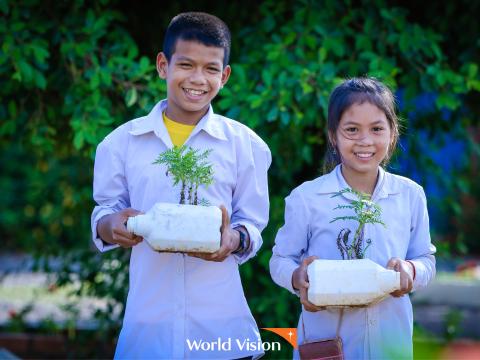Joint press release: COVID-19 lost learning needs immediate actions in catch-up process

Civil Society Organizations called for the Royal Government of Cambodia, donors, and all relevant stakeholders to join forces to step up their efforts to respond to the learning losses that resulted from the school closures during the COVID-19 pandemic in 2020 and 2021.
During the COVID-19 pandemic, Cambodia had one of the longest periods of school closure in the region with face-to-face education suspended for more than half of the official school calendar over the years 2020 and 2021. While actions were taken to support students to continue learning during these periods of school closures, they faced significant challenges that affected distance learning and led to significant learning gaps among students of all grades. Like many countries in the world, Cambodia is now facing an unprecedented learning crisis that will continue to impact the lives of the affected students, and the development of the country, for many years to come if it is not addressed.
To respond to this unique challenge, Mr. Var Sorin, Technical Programme Lead for Education from World Vision International-Cambodia (WVI-C), emphasizes that there are feasible solutions but that there is a need for immediate action on a big scale.
Sorin said, “several studies highlighted the potential learning gaps of children but our recent pilot project shows that it is possible for children to catch up with the level they should have reached without the school closure. But bringing this much-needed support to all the students that need it in the country urgently requires the highest level of mobilization and coordination from all stakeholders, especially from the Ministry of Education, Youth and Sports (MOEYS), development partners and civil society organizations.”
Following the reopening of schools at the end of 2021, the Royal Government of Cambodia adopted several measures aimed at supporting children to catch up and address learning gaps, specifically through the development of:
-
A condensed curriculum (for grades 2 to 6) to support schools and teachers to focus learning on Khmer and mathematics.
-
A remedial education package (for grades 2 to 6) for mathematics and Khmer to support schools and teachers to organize catch-up learning programmes.
However, the implementation of these promising measures is facing significant challenges such as the limited resources of local schools and the capacities of the teachers to implement the packages.
To support the response of the Royal Government of Cambodia and to address some of these issues, several organizations in the country, including World Vision and Kampuchea Action to Promote Education (KAPE), have implemented projects to support students to catch up on fundamental literacy, numeracy, and social-emotional skills needed to engage successfully in the formal education system at their grade. The evidence collected so far, and presented during the learning event, shows that these approaches work and that it is possible to respond successfully to the learning losses affecting students following COVID-19.
The organizers of the learning event on 14th July 2022, WVI-C, KAPE, CARE, and NGO Education Partnership (NEP), hope that this evidence will inspire all stakeholders to act to respond to the learning crisis affecting Cambodia.
“Diagnostic testing using remedial adaptive learning materials indicates that in many cases more than half of children have not achieved key curriculum competencies: we urgency need to better animate a prompt and coordinated response to the remedial needs of schools, not only to respond to the COVID-19 prolonged closure, but to establish remedial support in schools, as a longer-term response as the new normal,” said Phann Bunnath, Program Coordinator, KAPE.
“After the closure of schools during the COVID pandemic we now see the emergence of a global crisis on learning loss, including in Cambodia. During emergencies and disasters we need to make sure that we leave no one behind. Often women and children suffer most during disasters. In education we need to ensure that students with special needs or students with another home language get enough attention in the recovery program. For example, when we assess the learning loss we need to use tools that assess fairly and tools that are appropriate for these students,” said Jan Noorlander Deputy Country Director - Programme of CARE.
“We strongly recommend that the Ministry continue to bring school operations to their full capacity and continue the implementation of digital education, however we must not forget the marginalized learners and ensure that mitigation strategies are in place to alternative solutions to the remote and poor areas, marginalized groups, consider integrating technological knowledge in the annual appraisal criteria, and strengthen the capabilities of teacher and school managers to deal with the learning crisis, ” said Vera Ushurova, Project Coordinator of NEP.